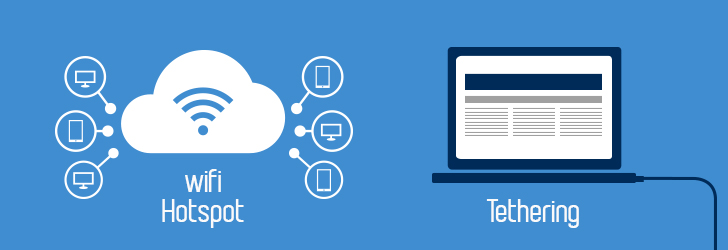
In the last two decades or so, a number of new ways through which we can access the internet have been introduced. Traditionally, the internet could be accessed via telephone wires, satellites, cables, and mobile devices. Often, tethering and hotspot are confused with each other.
One of the advantages of both of these techniques is that they can be used on-the-go and are easy to set up. In this article, we will first deal with tethering and hotspot individually and then conclude with differences between them and associated security concerns.
What is Tethering?
In technical terms, using one device as a modem to access the internet from another device is called tethering. Tethering can be established from either wireless or wired. In wireless mode, tethering is done via Wi-Fi or Bluetooth while in wired mode, USB cable may be used.
Generally, people associate tethering as a wired mode for accessing the internet. A cell phone is connected to a laptop or a personal computer via a USB cable and the internet connection on the cell phone is shared between both the devices.
What is Wifi Hotspot?
A Wifi hotspot is a wireless access point that provides internet access to the devices connected. These devices can be your cell phones, laptops, tablets, and personal computers. Hotspots are generally found in public places such as railway stations, airports, university campuses, cafes, and etc. You can also set up a hotspot in your home.
A hotspot can be created with the help of a router, laptop or computer, and smartphone. The typical range of a hotspot is around 30 meters. Generally, hotspots are available at fixed places, however, a hotspot created using your cell phone is portable and you can connect as many devices as you like.
What is the difference between a wifi hotspot and tethering?
Considering that almost every device comes with a built-in hotspot function, hotspot has gained significant popularity over wired tethering. In wired tethering, internet connection is limited only to a single device while multiple devices can be connected to a hotspot. Wired tethering consumes lesser amount of battery, as compared to portable hotspots.
Security Concerns Related to Hotspot & Tethering
Using tethering via wired connection is more secure as the communication between two devices cannot be intercepted. However, in case of a wireless connection, a perpetrator can intercept the data using tools such as Wi-Fi sniffers. It is always recommended to set strong passwords and use WPA2 while setting up a hotspot.
Other security protocols for hotspots include WEP and WAP. Considering that they are relatively older, a plethora of tools are available in the public domain to carry out a brute force attack and break into a network. Moreover, you should also not use a public hotspot to share your personal information as it can be easily leaked. If you need to share personal information over public wifi network, it is advisable to use VPN.
Share this post
Leave a comment
All comments are moderated. Spammy and bot submitted comments are deleted. Please submit the comments that are helpful to others, and we'll approve your comments. A comment that includes outbound link will only be approved if the content is relevant to the topic, and has some value to our readers.

Comments (0)
No comment